Barely five minutes out of an isolated camp deep in the mountains of Nantou County on Monday night, the lead member of our hunting party dropped to a crouch that the rest of the party instantly mimicked while he drew up the barrel of his homemade rifle and took aim. There was a moment of eerie silence and then a single thunderous shot lit up the forest in a blinding flash, echoing off the nature reserve's canyon walls.
Ducked in the bushes I couldn't see what the hunter was trying to shoot, but his mumblings seemed to indicate that he had missed.
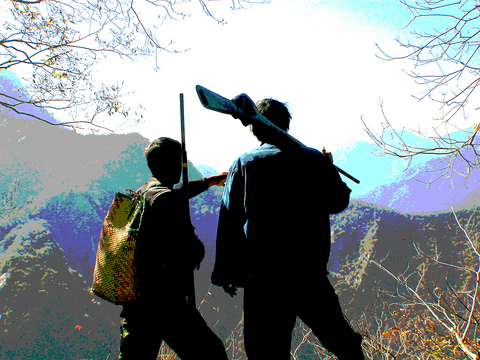
PHOTOS: MAX WOODWORTH, TAIPEI TIMES
Amazingly, though, the animal on the business end of the gun hadn't fled through the underbrush after the first shot, so the second hunter in our file stepped up, took aim ... and missed as well. Without waiting to reload, the exasperated man who took the first shot, Li Chen-hsin-te (
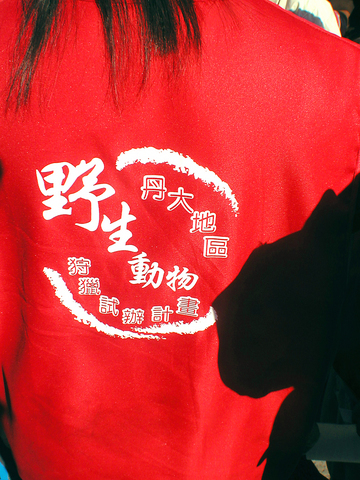
Though it was a tiny, perhaps one-month-old doe of the endangered species of miniature deer, its full-throated shrieking had the eight members of our hunting party wincing in pain trying to cover our ears until it was stuffed into a coarse plastic sack and eventually piped down. But as soon as it stopped, its mother could be heard somewhere in the obscurity of the forest, barking in a desperate but hopeless attempt to locate the doe it had been forced to abandon as we approached noisily through the bush.
I felt relieved the fawn hadn't been shot, but then I noticed that, curled up tightly in the plastic sack, it was about the size of a dinner plate and then I didn't feel so good. I realized at that point it was going to be a long two nights.
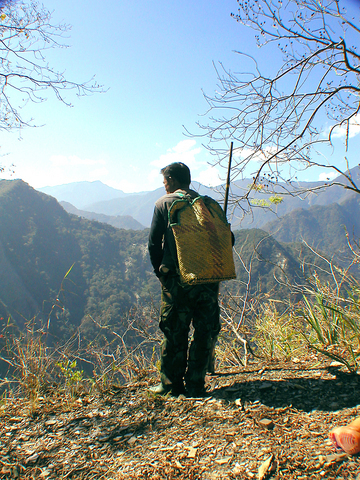
Cooperative hunting
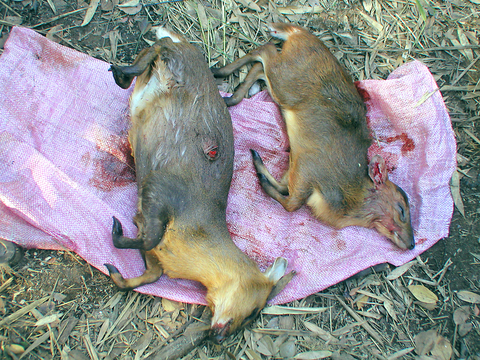
The hunting excursion had been arranged by Song Bi-chang (
The plan seeks to allow a limited number of Bunun Aboriginal tribe members access to the Danda Wildlife Refuge to hunt legally and then register their catch with Council of Agriculture and Forestry Bureau officials. The gambit for the Bunun tribe members is that, if successful, the plan could hand to them full management rights for a large sector of the reserve that had been their homeland before they were forcefully relocated by the colonial Japanese administration and then prevented from returning by the ROC government that followed.
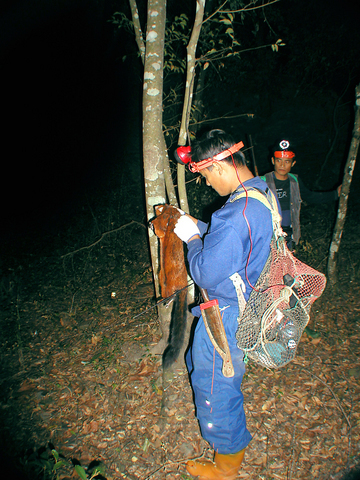
For the Bunun, who consider hunting a way of life and the ultimate expression of a man's worth within the community, the quest to reclaim the hunting lands is more than just a land issue. It involves a mission to achieve recognition of the tribe's religion, history and culture and, in the opinion of some, an opportunity to demand the many outstanding entitlements to compensate for their treatment at the hands of previous governments.
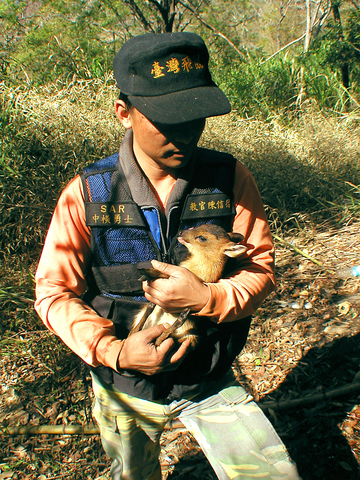
Once out in the nature reserve, however, the larger issues melted away and the hunting party became focused on their main purpose: killing whatever was dumb enough to trundle in front of their path.
For a while, I thought we were walking into an embarrassment of riches after catching the muntjac doe five minutes into the first night of hunting. But it turns out that either most animals were smarter than the doe, or there simply aren't many animals out there to shoot in the first place.
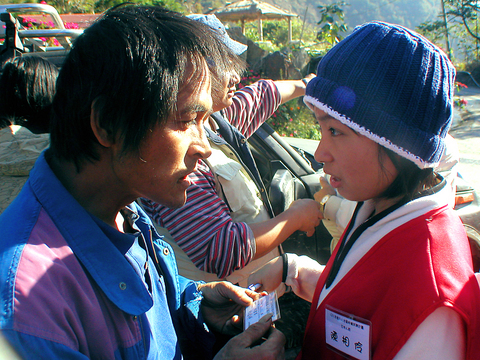
Creeping and crawling
The Bunun hunt at night, when the forest's mammals emerge from their daytime hiding spots to forage. As part of a traditional hunting code, they also talk as little as possible on the trail. After the arduous trip to the mountain camp, which included carrying four motorcycles across the waist-deep frigid waters of the Chuoshui River and a radically steep hike down a canyon wall, exhaustion helped us observe almost absolute silence while we hacked our way through the head-high, razor-sharp grass.
Song had also thought to inform me in a very serious tone before heading out to hunt that passing gas while on the trail constitutes the worst taboo on a hunt and that it can cast an omen over the entire process. Leaning in close, he said if I really had to fart, I should disappear into the forest beyond earshot to do so.
Aside from the rules against passing gas, excessive talking and vocalizing wishes for an abundant catch, the hunting party was surprisingly casual. On our frequent breaks, we squatted in the grass and passed a basketball-size bag of betel nuts back and forth and burned through pack after pack of Long Life cigarettes to stay awake.
The most seasoned hunter of the bunch, A-hui (阿輝), would occasionally break the silence to crack jokes in Bunun, while the others tried to contain their giggles. It was clear that the light-hearted violations of the silence taboo were part and parcel of the experience for the men, a secret that they would take back to the village and keep to themselves while they told of the solemn observance of the hunt's rituals.
After hours of looping through the forest without seeing a single four-legged creature, as we neared the camp in the pre-dawn obscurity another muntjac, an adult this time, made the fatal mistake of walking in front of our party and was shot. A few minutes later, yet another muntjac did the same and was followed quickly a flying squirrel that dropped like a brick from the tree on which it was perched after a bullet from one of the hunters passed through its abdomen.
Back at camp with the sun already risen and feeling a tad dejected by the low number of small specimens nabbed during the night -- a couple of the hunters had privately confessed they hoped to shoot a wild pig, Formosan serow or Formosan sambar -- everyone collapsed in the rudimentary bamboo hut built next to the overgrown stone ruins of the tribe's former settlement. Lunch, when I was awoken around noon, was the flying squirrel, stewed in a dark broth.
The hunters spent the remainder of Tuesday sleeping, feeding bamboo into the campfire so it would explode and send red-hot embers flying all over each other and checking on the muntjac doe that was yelping and tumbling around the camp still stuffed in its plastic sack. They also traded stories, the favorite of which was about a hunter some years ago who died when a bear trap crashed shut on his genitalia. This was supposed to be hysterically funny.
Better hunting through science
Only three groups of hunters were allowed to enter the wildlife reserve during a 10-day period that ends tomorrow under the Forestry Bureau's experimental plan, and our group was the last one. While in the wildlife refuge, shots from other hunting parties could be heard coming from outside the reserve's boundary. By eavesdropping on walkie-talkie frequencies it was evident that at least half a dozen hunting parties were prowling through the valley.
The members of our party attributed their less-then-spectacular catch to the previous groups having scared off all the animals from the reserve. Indeed, the night-long trudge on Tuesday yielded nothing, with the only hints of animals in the forest coming from the echoes of other hunting parties' shots.
Exiting the Danda refuge bleary-eyed and filthy after a second night of swinging machetes to cut paths through the forest, we were greeted by a surreal welcome committee of police officers, park rangers, officials from the Forestry Bureau, a few journalists, as well as volunteer university students in stark-white lab coats wearing surgical gloves to inspect the two dead muntjacs.
As Song and A-hui answered questions about the circumstances of each killing and their observations of the wildlife in the forest, the animals were weighed, measured and gutted to confirm their food sources and to extract DNA samples.
While the animals were being checked out, Wang Ying (王穎), a life science professor at National Taiwan Normal University and an outspoken advocate of the scheme, explained: "With better management we can hopefully reach the habitat's wildlife carrying capacity. Controlled hunting might help reach that goal."
Perhaps. But there have been dissenting voices from animal rights activists and religious groups.
For their part, the hunters are openly dismissive of the moral and political issues raised by the plan and watched the hubbub of the animal inspection from the shade of an adjacent shack. They said they looked forward to getting home for the climactic ritual of the hunt -- dividing up the meat for distribution between them, which would take place about an hour later back in Shuanglong. This is how the hunt had been conducted for centuries, one explained, and that was simply how it should be.
The captured muntjac doe, meanwhile, had somehow escaped unnoticed.

Many people noticed the flood of pro-China propaganda across a number of venues in recent weeks that looks like a coordinated assault on US Taiwan policy. It does look like an effort intended to influence the US before the meeting between US President Donald Trump and Chinese dictator Xi Jinping (習近平) over the weekend. Jennifer Kavanagh’s piece in the New York Times in September appears to be the opening strike of the current campaign. She followed up last week in the Lowy Interpreter, blaming the US for causing the PRC to escalate in the Philippines and Taiwan, saying that as

Taiwan can often feel woefully behind on global trends, from fashion to food, and influences can sometimes feel like the last on the metaphorical bandwagon. In the West, suddenly every burger is being smashed and honey has become “hot” and we’re all drinking orange wine. But it took a good while for a smash burger in Taipei to come across my radar. For the uninitiated, a smash burger is, well, a normal burger patty but smashed flat. Originally, I didn’t understand. Surely the best part of a burger is the thick patty with all the juiciness of the beef, the

This year’s Miss Universe in Thailand has been marred by ugly drama, with allegations of an insult to a beauty queen’s intellect, a walkout by pageant contestants and a tearful tantrum by the host. More than 120 women from across the world have gathered in Thailand, vying to be crowned Miss Universe in a contest considered one of the “big four” of global beauty pageants. But the runup has been dominated by the off-stage antics of the coiffed contestants and their Thai hosts, escalating into a feminist firestorm drawing the attention of Mexico’s president. On Tuesday, Mexican delegate Fatima Bosch staged a
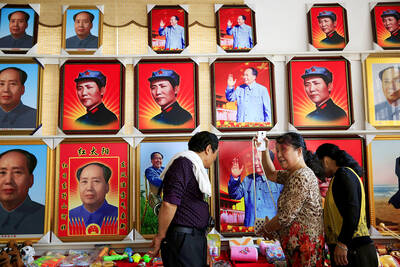
The ultimate goal of the Chinese Communist Party (CCP) is the total and overwhelming domination of everything within the sphere of what it considers China and deems as theirs. All decision-making by the CCP must be understood through that lens. Any decision made is to entrench — or ideally expand that power. They are fiercely hostile to anything that weakens or compromises their control of “China.” By design, they will stop at nothing to ensure that there is no distinction between the CCP and the Chinese nation, people, culture, civilization, religion, economy, property, military or government — they are all subsidiary